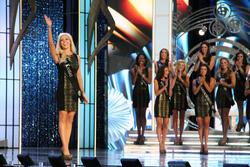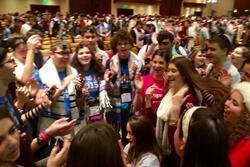We’re Not In Oxford Anymore
I am one of the biggest grammar freaks that I know. I proudly count myself as a “soldier of the subjunctive,” and I find cartoons about comma placement to be hilarious-- so it may come as a surprise that I was excited when The American Dialect Society voted an ”incorrect” use of English to be the defining word of 2015. The word in question? The singular “they.” To use “they” to express a single person, one could say, “I’m looking for my friend; they’re wearing a green jacket.”
It’s true that this use is grammatically ambiguous when referring to a person. On the other hand, it’s better to be slightly ambiguous than it is to be incorrect. Using “they” in the singular sense represents a massive step forward for the visibility and acceptance of the genderqueer/non-conforming community, many members of which use the they/them/their pronouns. When a person is genderqueer, it means that they do not identify as a man or a woman, but as a combination of the two, neither one, or as a different gender altogether. Another term to describe genderqueer people is nonbinary -- one who does not fall within the traditional gender binary. The American Dialect Society’s decision is groundbreaking because prior to this, many dismissed gender-nonconformity as an identity altogether, saying that non-binary people are “confused,” or that they just want attention. Usually, this denial of genderqueer identity arrives with a refusal to use the correct pronouns attached to it. Acknowledging this important use of the singular “they” represents a willingness to welcome the genderqueer community into the mainstream.
Many of my fellow grammar and English-language obsessives take issue with the they/them/theirs pronouns, whether it be with the awkward phrasing or the repurposing of a traditionally plural word. But here’s the thing: this is what the world is now. To refuse to “participate” is to deny the identities of people who use them-- and in this era of rapid social evolution, that’s no longer going to be acceptable.The American Dialect Society has signaled that we as a society are ready to acknowledge the gender nonconforming community as a complete entity, not just the way they look-- starting with our speech.
Oddly enough, high fashion (a frequently elitist and exclusive industry) has been clued into the concept of gender non-conformity for some time. However, the picture of genderqueer-ness that the fashion world presents to us is severely lacking in a myriad of ways. While perusing Jewesses with Attitude (the Jewish Women’s Archive’s blog), a 2009 article by Leah Berkenwald, “Androgyny: Progressive or Exclusionary?” caught my eye. In the piece, Berkenwald detailed some of the aesthetic components of gender-ambiguous presentation, and discussed how high fashion had adopted “the androgynous look”-- which is to say, in a pretty problematic manner. Most mainstream interpretations of genderqueer-ness are overwhelmingly skewed towards a “typical” young, thin, white man-- when in reality there are infinite ways to represent this identity. One of the things that I appreciated most about Berkenwald’s article was how she acknowledged the whitewashing and packaging of an incredibly complex identity that actually manifests in a million different ways. Seven years later, I’d like to add a Part II to her piece and point out that well-known fashion publications began to trumpet the “androgynous” look because of how “new” it was-- in other words, for its shock value and novelty.
No one’s identity is a fad.
High fashion is the most prominent example of society’s hypocrisy with regard to the genderqueer community. For years, many have pushed the boundaries of gender presentation for the sake of an aesthetic, but the pronouns they/them/their applied to a single person are very recent additions to the average English vocabulary. Thus, the American Dialect Society’s decision is a catch-up move of sorts. As a society, we have used bits and pieces of the concept of gender nonconformity, but have failed to recognize the state of being genderqueer in the media as anything more than a trend. We have used the face, but not the name. Humans like nothing better than to categorize ourselves-- and yet, until very recently, if one looked up “genderqueer” in the dictionary, an entire identity didn’t exist. The dictionary, supposed catalogue of language, has finally stopped ignoring a significant group of people who use language in exactly the same way that the rest of us do: to express ourselves.
Welcome to a new age of inclusivity, grammarians.
This article was also published on Teen Voices at Women’s eNews.
This piece was written as part of JWA’s Rising Voices Fellowship.








Great article! But speaking of problematic language: a blog called "Jewesses [sic] with Attitude"?!? Are you freakin' kidding?!? Oh, no doubt that's meant as "irony"; or something like those misguided attempts to "reclaim" the "b-word", the "n-word", etc. (And how's *that* workin' out for ya? Not very well.) But the effect can only be to spread stereotypes and contempt. PLEASE, people, rename your otherwise-excellent blog--so I can recommend it and forward its wonderful articles to everyone in the whole wide world. Until then--BLEAGH!
By the way: we're not in a 19th-century Sir Walter Scott novel anymore, either.